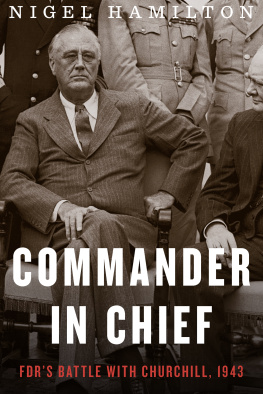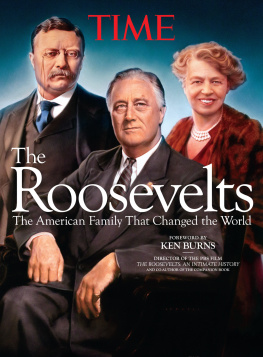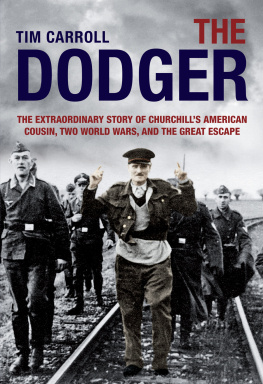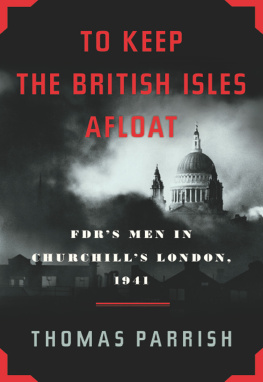

The latest edition of this work has been brought to publication with the generous assistance of Marguerite and Gerry Lenfest.
Naval Institute Press
291 Wood Road
Annapolis, MD 21402
2003 by Robert F. Cross
All rights reserved. No part of this book may be reproduced or utilized in any form or by any means, electronic or mechanical, including photocopying and recording, or by any information storage and retrieval system, without permission in writing from the publisher.
First Naval Institute Press paperback edition published in 2013
ISBN 978-1-61251-500-7 (eBook)
The Library of Congress has cataloged the hardcover edition as follows:
Cross, Robert F., 1950
Sailor in the White House: the seafaring life of FDR / Robert F. Cross.
p. cm.
1. Roosevelt, Franklin D. (Franklin Delano), 18821945. 2. PresidentsUnited StatesBiography. 3. SailorsUnited StatesBiography. 4. Seafaring lifeUnited StatesHistory20th century. 5. SailingUnited StatesHistory20th century. I. Title.
E807 .C76 2003
973.917092dc21
2003009159

 Print editions meet the requirements of ANSI/NISO z39.48-1992 (Permanence of Paper).
Print editions meet the requirements of ANSI/NISO z39.48-1992 (Permanence of Paper).
9 8 7 6 5 4 3 2 1
For Sheila, with love and appreciation
Thats the fun of sailing.
If youre headed for somewhere
and the wind changes,
you just change your mind
and go somewhere else.
FRANKLIN D. ROOSEVELT,
13 JULY 1932
CONTENTS
Every land-bound sailor will tell you that being on a boat (preferably a sailboat, but almost any boat will do) at sea, even for a short sail, provides a perspective and stimulus to a passion largely unobtainable anywhere else on earth. Being at sea also reduces almost everything else to its essentials, to a more manageable scale, and helps the sailor cut through distracting chaff to the core of problems, challenges, and issues.
I am no historianamateur, academic, or professional. I have spent much of my adult life choosing to avoid the lore and luster of my more famous ancestors. Although others in my generation are far more qualified to write a foreword to this wonderful and special book, I am honored and pleased that Robert Cross and our mutual friend Wint Aldrich asked me. Perhaps it was because I can bring a fresh perspective to reading about my grandfather, Franklin D. Roosevelt the sailor, and his relationship with the sea. More likely it was because my last name is Roosevelt.
Like my grandfather, I have an overwhelming, lifelong love of the sea and sailing. And much of my adult life has been devoted to protecting the oceans, coastal waters, and the marine environment. I learned at a relatively early age that water and the sea are precious to life in general. My own life and psyche are inextricably intertwined with them. Perhaps in that respect I reflect a heritage that came down genetically and socially through my father from my grandfather and ancestors farther back.
Life is replete with evidence that history repeats itself. This is also true within generations of the same family where both good and bad patterns repeat. I know my own father relished happy experiences when he, often along with his siblings, was on a boat with his father. He spoke frequently of these warm memories. Picturing my fatherand my grandfatheron a boat, I smile as the famous Happy Warrior cliche comes to mind: They always were joyful, enthusiastic, and vigorous sailors who respected the adversarythe overwhelmingly powerful and sometimes fickle seaand sublimely enjoyed and were refreshed by every second of the experience.
FDR was known for his insurmountable, indomitable confidence. Certainly some of this came from his status as an only child and the support and encouragement he received from his doting parents. Until his mother Saras death in 1941, FDR knew that she always stood behind him; her wealth would provide for any necessities or unexpected circumstances. FDRs father personally taught him to ride horses, to understand farming and agriculture, and, most important, to sail and appreciate being on the water. So much of FDRs confidence came from his relationship with the sea and sailing.
I have sailed many of the very same New England waters as FDR, first with my own father, FDR Jr., and later with my wife and children. I gladly admit that my strong personal links to FDR affect my objectivity regarding this book. Grandfather, son, and now grandson have all loved the same renowned New England coastal waters. An appreciation for sailing and seamanship, as well as a knowledge and appreciation of naval history, has been passed down through the generations. Our lives have been impacted by our seagoing experiences. As a sailor and grandson, I applaud Crosss superb effort documenting FDRs sailing life. Cross shows how a sailor can also be a leader of men, a man of courage, a man of versatility, a juggler of options and alternatives during a challenging and turbulent time, and how this particular sailor became larger than life for so many.
My familys sailing traditions go back much farther than three generations. Both sides of FDRs heritage, the Roosevelts and the Delanos, were seafaring people, explorers and adventurers. The first known Roosevelt in the New World was Claes Martenszen van Rosenvelt. Known as Little Claes for his exceptional height, he sailed on Henry Hudsons Half Moon into the Hudson River estuary. He supposedly jumped ship somewhere just south of where Albany is today. Claes returned months later to Nieuw Amsterdam with maps that he had made of the entire area east of the Hudson and west of what is now Long Island Sound. Another Roosevelt later was said to have been involved in the infamous triangle trade between the New World, Africa, and the Caribbean. Ancestors on the Delano side were involved in the China tea trade, whaling, and other seaborne commerce.
Given the myriad histories, biographies, and analyses written about FDR, his life, and his presidency, it is surprisingly refreshing that Cross, a talented historian and writer, elected to help us better understand FDR through his greatest passions: sailing and the sea. A sailor who loves being on the water, I can easily see and understand the connections Cross draws between the skills, temperament, and passions that make a person a great sailor, and those same elements that make a person a great politician and world leader.
Cross documents qualities desirable at sea: the necessity to learn how to change tack and be versatile in the face of changing weather, the need to understand the tradeoffs and consequences of compromise, the requirement for an explicit chain of command and leadership when aboard any vessel at sea, the desirability of confidence in choices and decisions made at sea, the influence good cheer can have on team work, and the ability to withstand and endure bad weather, storms, and discomfortsometimes outright pain. Cross ably demonstrates that these are the same qualities consistently required of a leader on land, whether a politician, a wartime commander in chief, a pied piper leading a country out of a depression, or a skilled negotiator among the worlds powers. The same confidence and inspirational qualities that FDR learned and practiced as a young sailor and Skipper at sea were his strength in overcoming polio. His almost superhuman effort to overcome polio, in turn, gave him complementary qualities. FDR learned to endure frustration and pain; he acquired courage, patience, empathy for others similarly afflicted by pain or misfortune, and the determination to succeed and make progress against insurmountable odds.
Next page










